Back in 2012, polling data indicated that about 46% of Americans overall explicitly rejected evolution and believed instead that the Earth is less than 10,000 years old, and that all living things appeared in their present forms (exact wording).
This was a landmark poll because the absence of any mention of human origins made it less potentially inflammatory, and the wording narrowed it down to YEC, rather than belief systems with mix science with Christian doctrine to varying degrees.
As Christians were about 75% of the American population at the time, that meant the subset of American Christians who rejected evolution was around 60%. Certainly easy to believe given how quickly the comments of any article or video about evolution fill up with Christians disputing whatever aspects of evolution they reject.
However, by 2014, the percentage was down to 42%. Now, in 2017, the percentage of Americans who hold YEC views is down to 38%, a record low. Good news for sure, but what's happening?
After all, if anything, the online visibility of Biblical fundamentalism has increased. Besides growing efforts to propagate creationism on Youtube, through websites aimed at kids, irl tourist attractions like Ken Ham's 'Ark Encounter' (which isn't doing too hot) and the infamous Creation Museum (also not doing well) there's also the recent resurgence of interest and belief in Biblical cosmology. Also known as the Flat Earth.
Flat Earth belief, I was told when I attended a fundamentalist Christian school, was an error of early scientists. "If science was wrong about the shape of the Earth" I was told, "why should we believe them about evolution?" However, like most everything else I was taught there, when I investigated that claim it turned out to be a deliberate faith-promoting lie.
In fact, flat Earth cosmology can be found in scripture, and today every Facebook page or website which promotes belief in a flat Earth is also covered in scriptural citations. Their rallying cry is that the flat Earth is proof of a creator, and that NASA lies about this in order to conceal the existence of a creator from the public.
This is of course totally backwards. Rather, the authors of scripture reasoned the shape of the Earth to be flat and covered by the dome of the sky by a mixture of direct observation and the assumption that it was created by an intelligent being. Accordingly it looks quite like a habitat built to accommodate people.
Scripture describes Earth as a disc covered in a solid dome called the firmament. It holds the waters above apart from the waters below, which were divided at the time of creation. The waters above are occasionally allowed to fall through trap doors in the firmament, the Biblical explanation for rain.
Christian moderates point to a very small number of Christian scholars at the time who were aware of Greek experiments demonstrating a round Earth, and imply based on this that every Christian alive at the time knew the Earth to be round, that flat Earth cosmology was never part of Christian doctrines and that descriptions of it in scripture are purely metaphorical.
The problem with this is that many other cultures at the time also believed the Earth to be flat. Egypt and Babylon both had flat Earth cosmologies, conceiving of Earth as a flat square like a game board, where the firmament was a fabric stretched overhead like a tent or a bedsheet draped over a table rather than a solid dome.
Even the norse religion of Asatru includes a flat Earth cosmology wherein Earth realm and every other realm are flat expanses, some held up by branches of Yggdrasil, encircled by a serpent. It also includes the ice wall, in some conceptions, which modern flat Earthers believe keeps the oceans from spilling off the edge and accounts for the existence of the North Pole and Antarctica.
Moderate Christians do not defend these flat Earth cosmologies of other religions as having been metaphorical. Because they do not belong to those religions, they are not invested in defending them, so they simply allow them to be wrong rather than propping them up with apologetics.
They do the same with the creation stories of other religions. No moderate Christian today (or YEC for that matter) defends the creation story of Asatru, wherein the ice giant Ymir and his cow Audhulma are trekking across the icy plains when Ymir dies. His decomposing body becomes the Earth, his blood the rivers, his hair the grass, and his sweat becomes the first humans.
Christians of all stripes look at this, rub their chins and think "ah yes, I can see how they might believe that, they were primitives who did not know any better and made assumptions based on direct observation of the world around them, as well as the assumption that their religious stories were true". Not realizing, you see. Not turning that same perspective back on their own beliefs.
So today's creationists are trying to clothe in the terminology and outer appearance of science a worldview, cosmology and account of human origins extremely similar to what many other ancient cultures believed.
At the same time, if surviving practitioners of Asatru were to come up with a similar "scientific" version of their own creation story, Christian creationists would recognize the absurdity of it. It is only their own creation story which they believe science can be reconciled with, because it is only their own religion they believe is true.
What's interesting to observe is that flat earthers are of course uniformly YEC, as they have gone to the furthest extreme of assuming the claims of the Bible concerning nature/cosmology to be true. But the majority of YEC in the world accept the Earth is not flat, and deny any association between creationism and flat Earth belief (because understandably it is embarrassing).
This is despite the ICR (Institute for Creation Research) having flat Earthers among their fellows. But then, there are OECs (Old Earth Creationists) who are knowledgeable enough about geology to recognize the Earth is most likely not 10,000 years old or less, and they commonly protest any association with YECs because it's embarrassing.
So already, Biblical literalism is stratified into layers, or a spectrum, arranged according to the degree to which one assumes the claims of the Bible about cosmology and origins to be correct. You have flat Earthers at one absolute extreme, then YECs, then OECs. Then you have theistic evolution, the view of Christians who are a little more knowledgeable still than OECs to the point of recognizing evolution is true, but they still assume Christianity is ultimately true, so they believe it must be possible to reconcile with evolution.
This is commonly done by invoking the day-age apologetic introduced in the US during the Scopes monkey trial, really just a ruse to get creationists out of the way of accurate science education. It doesn't hold up under scrutiny. Moderates never discover that because they were so relieved to find an ostensibly workable synthesis of evolution and Christianity, they took it at face value and dug no deeper.
I have written this article, and this one, on prior occasions about the specifics of why the day-age apologetic does not actually reconcile Christianity with evolution.
At the absolute opposite end of the spectrum, you have atheism, which does not assume that any of the Biblical claims discussed here are true. It does not assume they are false (a common Christian accusation) because no such assumption is necessary, that's already what the evidence points to and as yet no creationist institute (such as ICR, Answers in Genesis or The Discovery Institute) has published any peer reviewed papers which credibly contradict evolution.
Why this spectrum fascinates me is that each group can see that those to one side, who believe more completely in Biblical claims than they do, is just dumb. Indoctrinated, or lacking the necessary education. This is how YECs see flat Earthers, how OECs see YECs, how theistic evolutionists see YECs and how atheists see theistic evolutionists.
However, every group at the same time considers those to the other side of them, who do not believe in Biblical claims as completely, to be deceived by Satan in some respect. It's sort of like the old George Carlin bit, "When you're driving on the freeway, everybody going faster than you is a maniac, everybody going slower is a moron". Every group believes they have struck the exact right balance between science and doctrine.
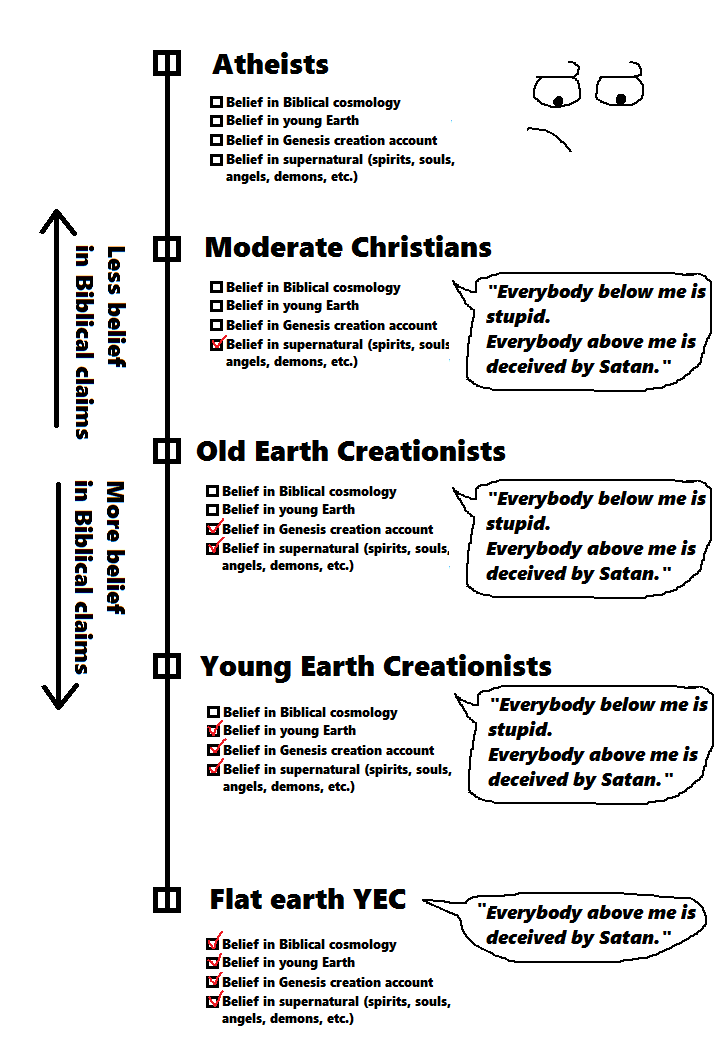
Is there such a thing as a correct balance between science and Christian doctrine? What is the "right balance" between science and Asatru? Or between science and Hinduism? Each group would privilege their own religion exclusively when considering how religion and science intersect.
The Hindu says "of course science is compatible with Hinduism. After all, both are true, and how can two truths be incompatible"? So says the Muslim about Islam, the Mormon about Mormonism, etc.
"You're looking at it all wrong" I have often heard from OECs and moderates. They then explain to me their carefully contrived rationale for why their own particular formulation is the objectively correct one that was intended by the authors of scripture all along, and is completely different from/unrelated to every other similar synthesis of Christianity and scientific findings. I often wish I could tag out, and replace myself in that discussion with someone from a different point on the spectrum who also believes their own particular formulation is uniquely solid.
When I discuss any of this with creationists, either YEC or OEC, I often hear some variation of "Creation scientists and atheistic scientists both look at the same evidence, but through different lenses. One which assumes the Bible is true, and one which assumes it isn't." This is a very interesting case of projection.
They know that they are assuming, a priori, that their religion is true and interpreting evidence in a way which doesn't allow any other conclusion. To justify this, they must make it out as though the opposition is doing the same thing. Although in their defense, maybe they really believe that everybody is equally full of shit and secretly uses the same tactics they do.
You can see this in the creationist claim that the timeline of the universe arrived at by physicists, astronomers and cosmologists is only billions of years long because it needed to be in order to allow time for the natural processes they believe shaped stars, planets and so on to take place.
Likewise, that the Earth was deliberately decided to be 4.5 billion years old because it was necessary in order to allow time for evolution to take place. This is how creationists view secular science, from the assumption that it's equally corrupt and also designed to serve a particular ideology.
In fact, whereas creationists used to promote 6,000 years as the age of the Earth, it is now far more common to see them favoring 10,000 years because of archaeological findings since the 70s (when creation science was invented and began to promulgate in Christian circles) of human records older than 6,000 years.
Amusingly, some of these records were beer receipts and records of other mundane financial transations, simply because financial records were much more scrupulously preserved and securely stored than other writings.
As such, those are what survived the ages. We have far, far more business records from ancient Egypt, for example, than anything else. Many of them are dated to well before creationists originally held the creation of Earth to have taken place.
Similarly, I also encounter a great many creationists today who accuse the phrase "climate change" of being a new term invented to disguise the failures of "global warming", though both terms are found in climatology literature dating back to the late 70s. It is an appealing narrative for someone of that mindset, and understandable why they might assume it's true, given that they have pulled that exact switcheroo themselves:
Those are just a few examples where they've done exactly what they accuse secular scientists of. It then becomes understandable how they might assume secular scientists operate in the same way. If one believes evolution, climate change and other major findings of modern science to be fraudulent, this sort of view of how they operate begins to make sense.
The problem here is, that an overwhelming majority of western scientists were once Christians. Today, a majority are irreligious, a mixture of atheists and agnostics. How did that happen, do you suppose?
Clearly, when the geological evidence for an old Earth was being uncovered, and when the findings which led to the discovery of evolution were being collected, the scientists responsible were Christians. Even Charles Darwin began his career in science as a Christian.
So they could not have begun from the assumption that Christianity is false. That is just a slanted, defensive "They're all against us!" perspective meant to dismiss as biased every non-Christian scientist, and all scientific findings which are contrary to Christian doctrine.
Another variation is "You're assuming naturalism". Naturalism being the view that we live in a universe of matter, energy, space, time, waves and the stuff physics talks about, but not spirits or any other supernatural elements. Again, it is not necessary to assume naturalism because no evident for supernaturalism has ever been demonstrated.
In fact every time anybody has ever purported to be able to demonstrate a supernatural phenomenon, when they voluntarily attempted to do so under lab conditions, it turned out to either be delusion or a fraud. Should we not recognize that pattern and extrapolate from it? Is it likewise an assumption to say there will probably be a sunrise tomorrow?
Organizations which promote creationism do a distressingly good job of convincing creationists that they are the true skeptics. That secular science operates in the same corrupt, biased, ideologically driven way that creation science does, which at the very least puts them on even footing and warrants equal time in classrooms.
It is in fact a slanted, contrived perspective which excuses its own dishonesty under the assumption that everybody else is equally dishonest in secret. An example of this secretive dishonesty can be seen in the outcome of Kitzmiller vs. Dover, the now famous 'Dover Trial' of Pennsylvania (presided over by a Christian judge and jury, in which one of those who argued for evolution was Christian professor Kenneth Miller).
A documentary recounting the trial can be watched for free here. It was found that creationists looking to get their textbooks into public schools had been so sloppy as to use the Find and Replace function in a text editor to replace every instance of "creationism" with "intelligent design", and "creationists" with "design proponents".
A mistake entering the term they meant to replace resulted in the following passage:
The basic metabolic pathways (reaction chains) of nearly all organisms are the same. Is this because of descent from a common ancestor, or because only these pathways (and their variations) can sustain life? Evolutionists think the former is correct, creationists accept the latter view.
...being replaced by:
The basic metabolic pathways (reaction chains) of nearly all organisms are the same. Is this because of descent from a common ancestor, or because only these pathways (and their variations) can sustain life? Evolutionists think the former is correct, cdesign proponentsists accept the latter view.
"Cdesign propentsists". Round of applause, everybody. This is why sometimes, as frustrated as these people make me, I can't be mad at them. They are deeply dishonest, but also dopey bumblers. Like the villains from Saturday morning cartoons who have sinister intentions but cannot get away with it because of foolish mistakes.
Kitzmiller vs. Dover is also where flaunted cdesign propentsist Michael Behe was put on the stand and asked to defend claims made in his book, "Darwin's Black Box". If you have spoken with creationists at any length they have probably brought up the term "irreducible complexity" and the bacterial flagellum as an example of it. This book is where they got that from.
At one hour, eleven minutes and ten seconds in, it is shown why the bacterial flagellum is not in fact an example of irreducible complexity. For it to be, there would have to be no simpler version of it which performs any useful function for natural selection to act upon, such that it is only useful to the bacterium in its fully completed state.
This is essentially a retread of the much older creationist argument concerning the human eye. Look how complex it is! A biological camera. How could this have evolved? Only, there exist eyes of wildly varying degrees of complexity in other animals either because we share a common ancestor or because eyes are so damned useful that they have independently evolved in other lineages many times.
Some of these eyes are as simple as patches of photoreceptive cells. Some are a little more complex, the same cells arranged in a depressed "dish" enabling detection of which direction light is coming from. And so on and so forth with recession into a chamber with a narrow opening that works like a pinhole camera, the addition of a fluid filled lens, and so on.
The same principle holds true for the bacterial flagellum. Though, like the human eye, it is another example of astonishing complexity found in nature, there also exist incomplete versions of it in other species.
The same mechanism, but non-rotating, used instead for the injection of poison. And in yet simpler iterations, for the expulsion of waste. Q.E.D, the bacterial flagellum is not irreducibly complex. Now, those less complete versions didn't have to exist. If 'cdesign propentsism' were true, they shouldn't. But they do, as predicted by evolutionary theory.
This is true also of the order we find fossils in the geological strata. They are arranged by depth in an order consistent with the order in which they evolved, according to the taxonomic tree and more recent genetic sequencing. That makes perfect sense if evolution is true, but is the most unfathomably immense coincidence possible if it isn't.
What is evolution, anyway?
One of the recurring themes in my discussions with creationists is that they cannot accurately define how evolution is supposed to work. When I ask them, I get an answer like this:

The only thing resembling a definition of evolution I can get out of them is creationist rhetoric about the partial extent to which they believe evolution is true, and where they draw the line. That is not a description of how natural selection operates but a definition of the extent to which they accept it. It is a declaration of belief.
This is usually because they were taught about evolution only in an extremely limited, ideologically constrained way which shielded them from what evolution actually is (lest they helplessly accept it, recognizing it is necessarily true) and instead taught them only creationist apologetics concerning evolution, as if that were the content of evolutionary theory itself.
So it is that most creationists, whether OEC, YEC or flat Earther, reject evolution without even knowing what it is. They were taught about it in a way intended from the outset to ensure that they never properly understand it, and only know creationist arguments against it.
Much of what they "know" about evolution may also be deliberate misinformation, which they are taught as if it's what evolutionary biologists actually believe to be true. For example, I was taught that evolutionary biologists believe all life descended from rocks.
So, I thought it might be useful to give a brief rundown of what evolution by natural selection is and how it operates. To begin with, probably you accept that when two parents have a child together, the child is a mixture of their genes. He or she inherits genetic traits from both parents, the basic principle of heredity.
When ancient man noticed this principle at work in livestock, he reasoned that by breeding the individual animals with the traits he liked, and not allowing the individuals with the traits he disliked to breed, over time the population of animals in his herd would change.
The traits he selected for when breeding would propagate, gradually replacing the traits he selected against. Eventually every individual in the herd would have the traits he selected for, and none would have the traits he selected against, just by a slow process of replacement, because the animals being selected for had all the babies and the ones selected against had none.
This is an extremely strong form of selection as those selected for have 100% of the offspring and those selected against have 0%. This is why animal husbandry, aka, selective breeding, can produce such drastic changes so much more quickly than natural selection.
In natural selection, the same process occurs, except that there is no man choosing which animals breed. Rather, it is the naturally occurring environmental conditions they live in, such as food availability, predation, weather, etc. which decide that. Because typically no individual in a species is 100% ideally adapted to these conditions where the rest are 0%, evolution proceeds very slowly.
Those individuals who are slightly better adapted have more children on average than those who are slightly less well adapted, and more of those children survive to the age where they can reproduce. This means it takes many, many generations for the traits which make certain individuals better adapted to propagate throughout the population until they are the new norm.
But how does it come about that some individuals are better adapted than others? Some of that is just luck of the draw with respect to hereditary genetic recombination, but new genetic information can occur from outside interference. This is referred to as mutation.
This takes place because although our DNA is very good at copying itself, and even includes many mechanisms for preventing copying errors, those errors still sometimes occur. Usually they affect something subtle and impossible to notice, so if they get passed on, it's for other reasons. They are "just along for the ride."
But other times the mutation is more severe and noticeable. When this occurs it is usually a birth defect which makes the individual less fit, not more. Creationists point to this and conclude that life began from an ideal initial state, along with the rest of creation, but that everything has been deteriorating since.
This view does not allow for positive, useful mutations to occur. Which is a problem for creationists, because that has been directly observed taking place in experiments:
A gigantic petri dish, essentially (though rectilinear) was built and a layer of sterile agar (bacteria food) was deposited in it and allowed to solidify. Agar is just general purpose bacterial growth substrate, and typically what petri dishes contain.
It was divided into vertical strips, where the strips at the outermost edges had zero antibiotics in them. However, each strip after that towards the center contains higher and higher concentrations of antibiotics, serving as more and more lethal barriers to continued growth.
As you can see, when the bacteria grows all the way up to reaching the first barrier, it initially cannot continue. The antibiotics kill any intruding growth:
But then, at various points, mutations occur in the constantly reproducing bacteria. The descendants of those mutated individuals (at the point where new growth into the adjacent strip begins) then spread outward into their new frontier. The red dots show where these mutations occurred:
It has been made survivable for them by their mutated resistance to that concentration of antibiotics, which they inherited from their shared ancestor at the point where the new growth into that region began. Then, they reach the next strip. The same thing happens. It is steeply more lethal than the one before.
But at various points, a mutation in the constantly reproducing population of bacteria occurs, and the descendants of that mutant are able to spread into the new region:
So it goes until they at last saturate the entire dish. Crucially, this demonstrates that evolution not only occurs, but is capable of producing new capabilities in a species. Creationists who partially accept their own, artificially limited form of evolution deny that this is possible, imagining it is a strictly degenerative process from more capable to less. That capabilities can be lost, in other words, but never gained.
So by now, providing you agree heredity is real (having probably observed it in your own life) you can see how environmental changes can act on hereditary principles, effectively performing a sort of selective breeding simply by affecting which individuals are able to survive long enough to reproduce, how many children they can support and so on.
"Alright" says the creationist, "but that is proof only of micro evolution, not macro." Micro evolution and macro evolution are not terms used within biology. They were invented by creationists for this exact purpose, so they could comfortably concede the amount of evolution possible to directly show to them, but deny that it can progress far enough that a species could turn into something unrecognizably different.
But what special barrier prevents this from occurring? If small amounts of evolution can happen, why would this process stop at some arbitrary point? How would evolution "know", for example, not to turn dinosaurs into birds because a specific religious group of humans considers dinosaurs and birds to be different Biblical "kinds" of animal?
"Kinds" are also not a concept used in biology. They differ from species in that Biblical kinds are based roughly on what type of animal an individual organism looks like to a Christian. For example, they do not deny that dogs are descended from wolves, but are not troubled by it because they consider dogs and wolves to be members of the same "kind".
If that doesn't sound terribly scientific, it's because it isn't. But here, again, creationists run into a problem. It is no longer tenable to deny that modern birds are descended from dinosaurs. Well preserved fossil remains of Archaeopteryx plainly show both feathered, birdlike wings and a snub nosed saurian snout with sharp teeth inside:
Couple this with other recent finds indicating that all manner of dinosaur species had some amount of feathers, not originally evolved for flight but instead as a way to keep warm.
However, that's not the smoking gun. A creationist might still say every one of these fossil remains is a hoax, or arbitrarily decide that Archaeopteryx was "fully bird" and not partly dino, as some actually do. However, when dinosaurs evolved into recognizably modern birds, their genome did not dispense with the traits which made them dinosaurs. It just switched them off.
This capability is selected for because species able to re-activate dormant, previously evolved traits can adapt more quickly to rapid environmental changes than species who have to evolve that trait from scratch all over again, "reinventing the wheel".
As a consequence, modern birds still contain within them the genes which control for saurian morphological traits. When those genes are re-activated, an interesting thing happens. They grow teeth.
This occasionally happens on its own due to a mutation reactivating the genes for teeth formation, but incompletely. When the full set of genes associated with the saurian teeth and snout are switched back on, the beak also disappears, replaced by a snub dinosaur-like snout.
This did not have to be so. Evolution predicts it should be so, if birds did indeed descend from dinosaurs. If it weren't the case, it would cast doubt on that conclusion and be more consistent with creationism. But the reality is that in fact, birds are descended from dinosaurs and still contain the genes necessary to turn them back into dinosaurs if we wish it.
So now, I have demonstrated that evolution occurs. It works the same way as animal husbandry, but with changing environmental conditions doing the selecting. I have demonstrated that it can produce positive, useful new capabilities, not just defects. I have lastly demonstrated that it can so radically alter a species that it is unrecognizable compared to its distant ancestors.
I could spend some time recounting other smoking gun examples of speciation, such as the fact that modern whales have a pelvis and leg bones that don't even attach to it. Or that in fact the migration out of the sea never fully stopped, and multiple species of fish exist which can breathe air and locomote on land.
I've also written certain articles in the past wherein the reliable appearance of mathematically significant patterns like spirals and fractals in nature are explained, being that those specific patterns always appear in the results of procedural generation. Aka the gradual accumulation of complexity from simple starting conditions according to rules simple enough to naturally occur.
That's all just trivia, though. It's very easy to become fixated on the tiny details and argue them until you're blue in the face, something creationists excel at. What's important here is the big picture. There are also much more direct ways to resolve the question of whether or not life was created that entirely bypass the matter of evolution.
If you'd like to do further reading, I recommend this article and this one on the Lockhaven University website about the history of flat Earth cosmology and the Biblical basis for the modern version of it. For a more complete discussion of evidence for evolution, the talk.origins archive is still my go-to.

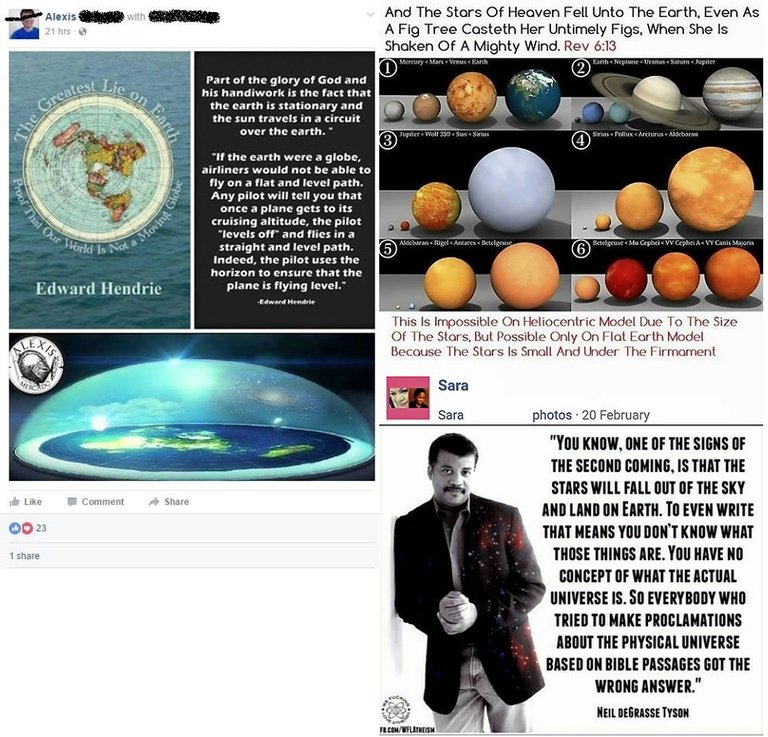
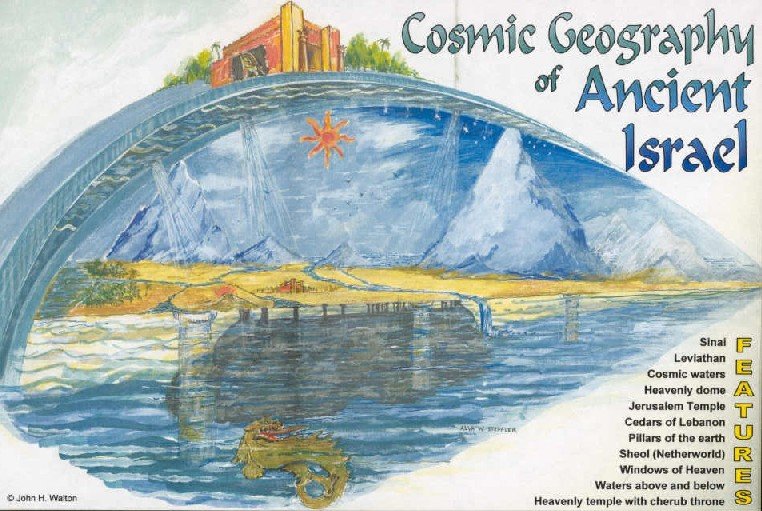
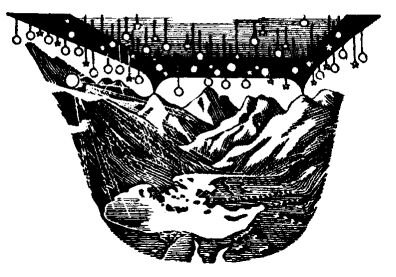
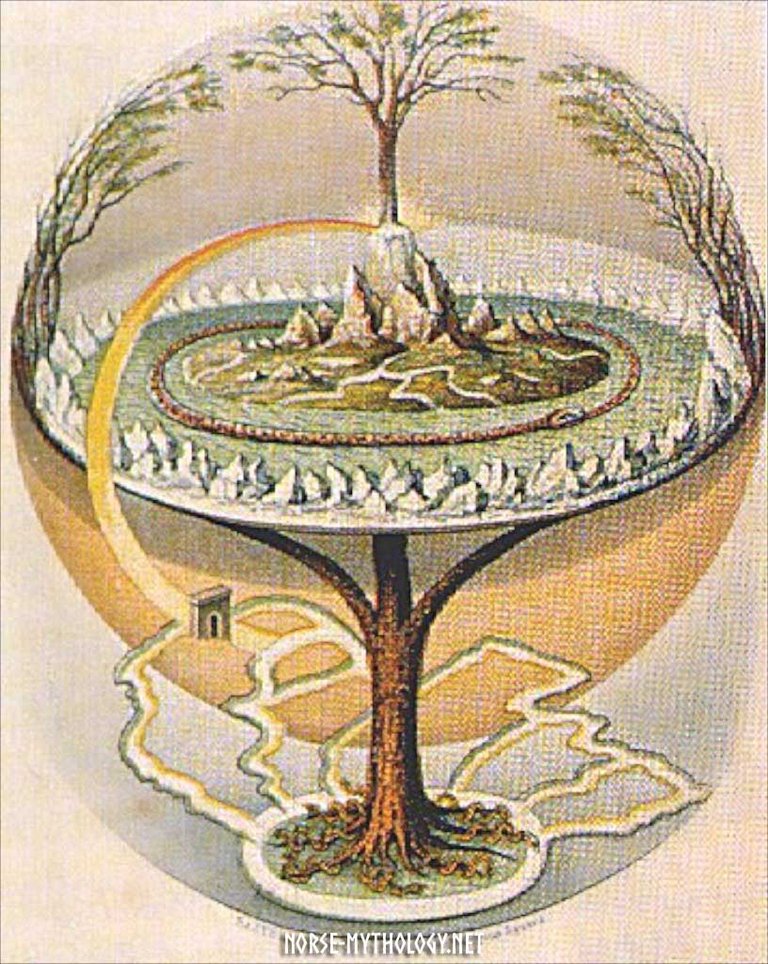
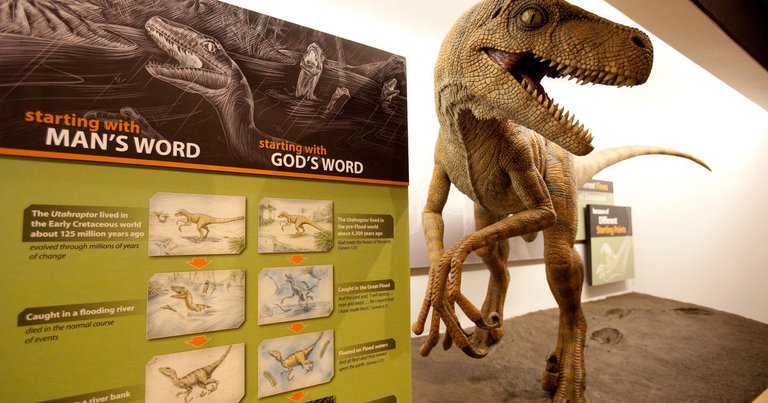

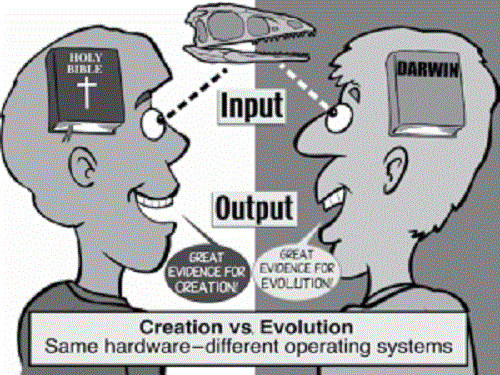


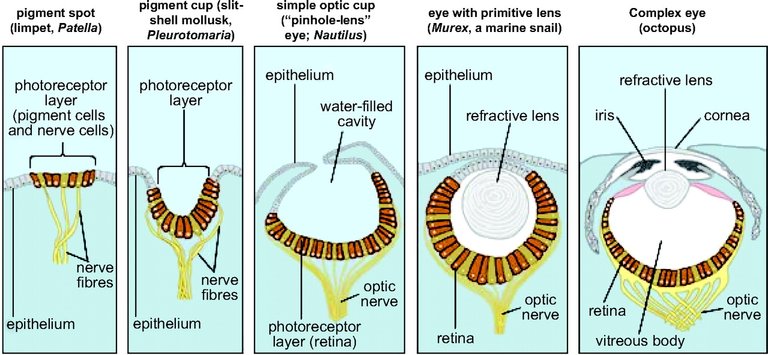

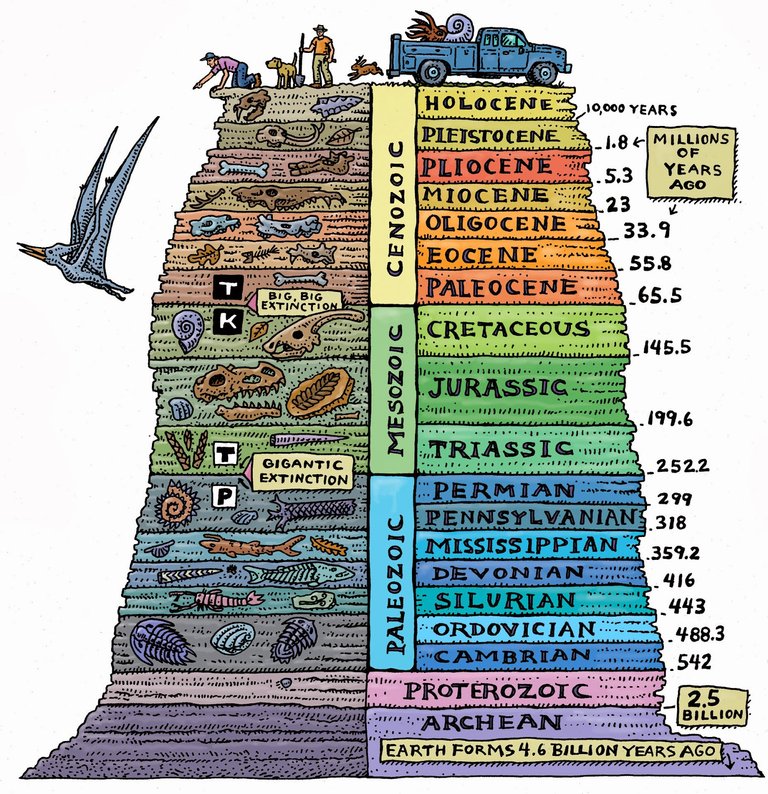
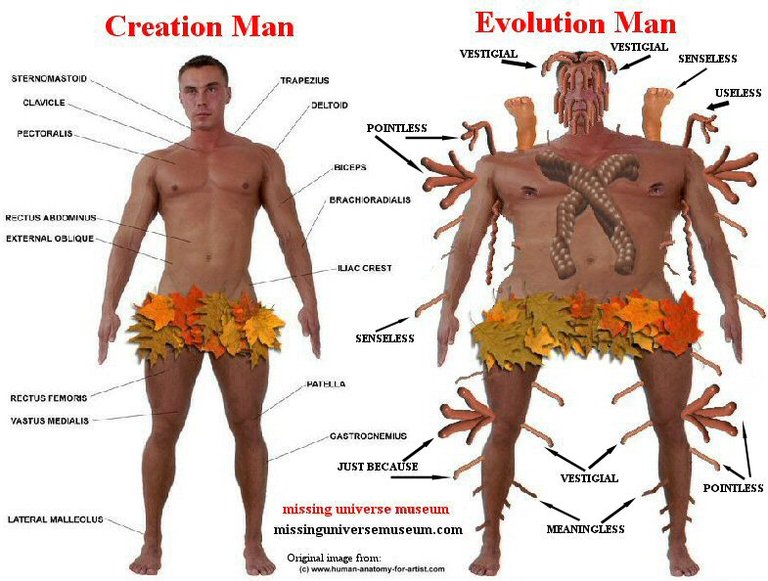
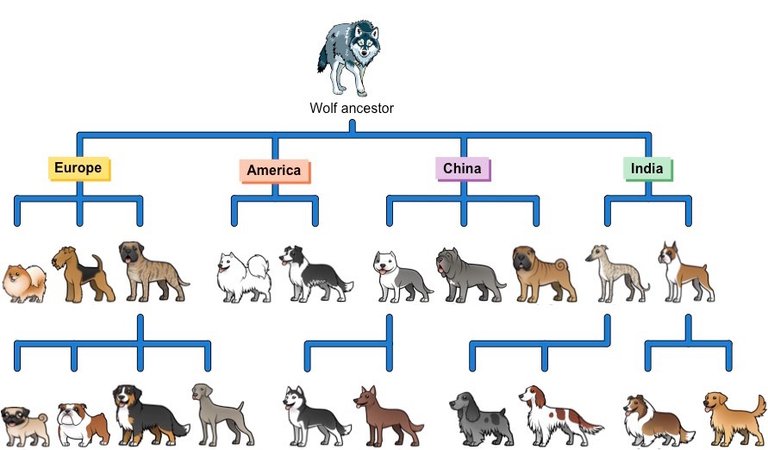

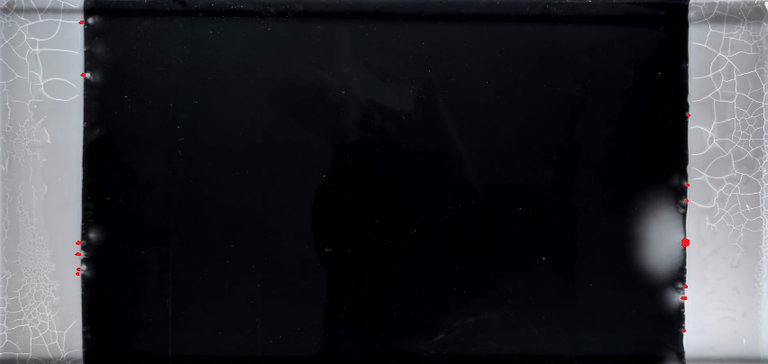

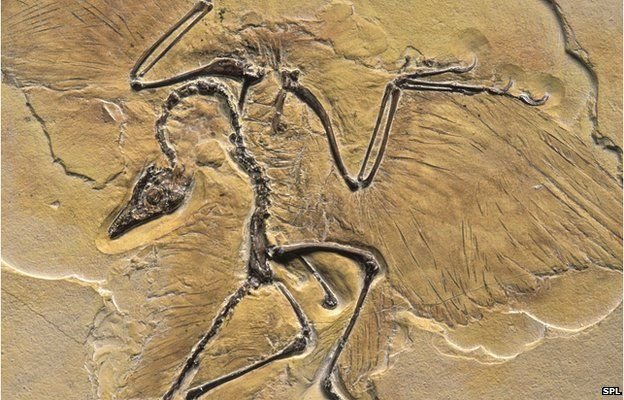
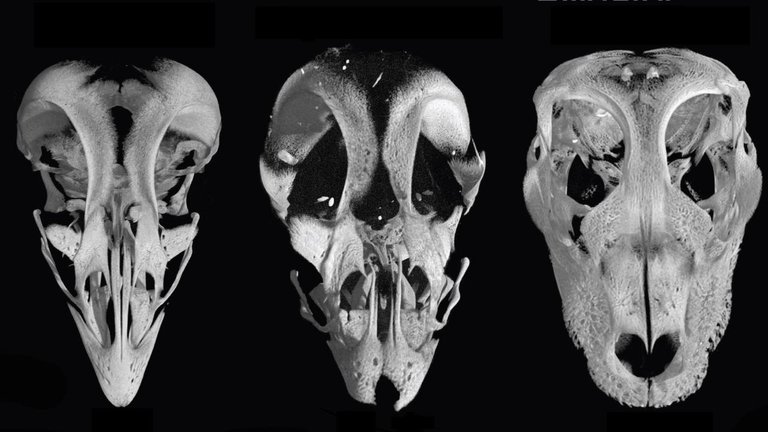
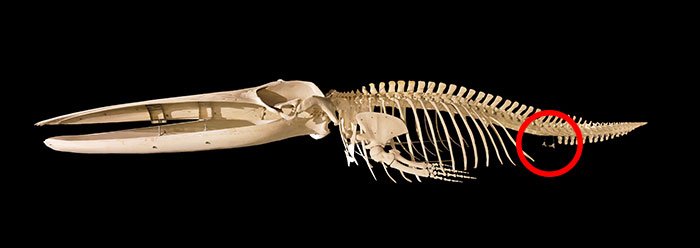
Interesting. Thanks for this. I'm linking to this in my article.
Interesting. Thanks
For this. I'm linking to this
In my article.
- joeyarnoldvn
I'm a bot. I detect haiku.
I find it odd that flat earthers seem to think their interpretation of poetry and allegory trumps verifiable evidence. I also find it odd that atheists feel a need to lump together all who oppose their cosmology in a single group despite disparate interpretations and analysis in order to feel superior. For a self-professed rationalist, your post is dripping with informal fallacies.
I haven't lumped them together. On the contrary if you finish reading the article I distinguish groups like YEC, OEC, and theistic evolution from one another and explain how they relate to each other, to science, and to scripture.
I am also not an atheist. Atheism is not the only possible alternative to Christianity, and it is not only atheists who recognize it is false.
I am not a Christian, nor a flat-earther, but I am skeptical of some claims made by modern cosmology and evolutionism and the world view built upon these principles (or a misunderstanding thereof).
So I disagreed initally with your approach – one of "talking down" to the "lower strata" of creationism – but found your simultaneous skepticism towards the "higher strata" (atheism) intriguing.
All in all, you have done a great job, by means of sound argument, dispelling some of the myths many creationists still uphold despite the availability of better knowledge; you may even have changed my mind in one point or another.
One aspect of evolution, however, seems to have fallen under the table, and I would like to invite you to expand on it: biogenesis. From what creationism teaches, the gap between the most complex anorganic molecule and the most simple organic molecule, able to kick-start the whole stable "chain reaction" process of metabolism and procreation, remains unbridged.
For it still seems to me that, while entropy is the governing law of the universe, such a process betrays a higher order, which points either to intelligent intent (gasp) or a yet-to-be-explained function of the natural laws.
Turtles all the way down!
Allow me to address this paragraph also:
Robert Anton Wilson, in turn, has challenged skepticists to demonstrate a natural phenomenon, which is funny :) Jokes aside, it seems "remote viewing" has some empiricism behind it. Also looking forward to the outcome of Lucien Hardy's take on the Bell experiment (whatever the outcome).
Not necessarily; that is as if the Wrights had taken Icarus' experiment, da Vinci's drawings and all other failed attempts at getting airborne to conclude that it's impossible to fly with a machine heavier than air.